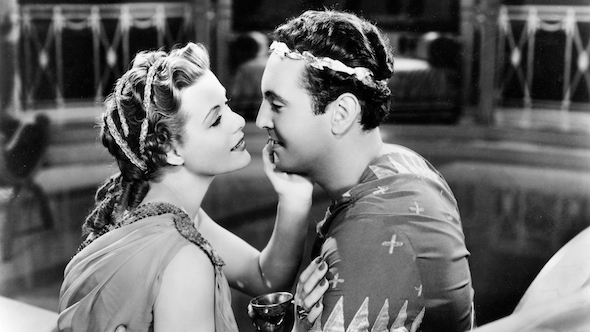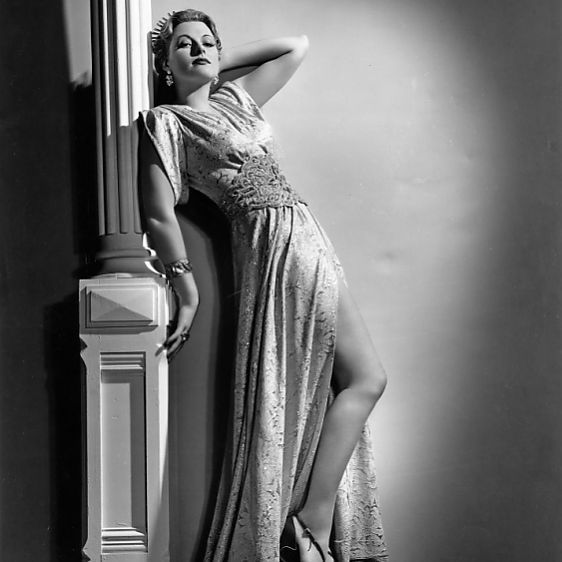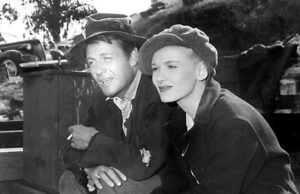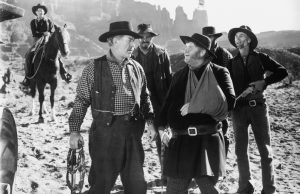The Boys From Syracuse (1940)

Toronto Film Society presented The Boys From Syracuse (1940) on Monday, February 16, 1987 in a double bill with Hold That Ghost as part of the Season 39 Monday Evening Film Buffs Series “B”, Programme 7.
Production Company: Universal. Producer: Jules Levery. Director: Edward Sutherland. Based on the Musical Comedy by: George Abbot, Richard Rogers and Lorenz Hart.
Cast: Allan Jones (Antipholus of Ephesus, Antipholus of Syracuse), Martha Raye (Luce), Joe Penner (Dromio of Ephesus, Dromio of Syracuse), Rosemary Lane (Phyllis), Charles Butterworth (Duke of Ephesus), Irene Hervey (Adriana), Alan Mowbray (Angelo), Eric Blore (Pinch), Samuel S. Hinds (Aegeon).
A light night of entertainment on the screen of the Music Hall Theatre tonight, with no real relation between our two features, other than the fact both have been somewhat lost in the celluloid shuffle of recent years.
The Boys From Syracuse was adapted from the musical comedy, which in turn was adapted from Shakespeare’s Comedy of Errors, and was revived at Stratford during the last Festival season. Not unlike the updating of Taming of the Shrew into the hit movie musical Kiss Me Kate, our film tonight is described in The New York Times review as part of the “ancient and honorable sport, the one of kidding the Klassics by tossing modern, colloquial gags against antique backgrounds, and setting a troupe of contemporary comics to making anachronistic fun.”
The original stage show was still fresh in the minds of the 1940 movie-goer, with the original production only two years earlier. The result initially was a mixed bag of reviews to the movie production.
The story is set in ancient Greece, although the writing credit on the screen notes: “After a play by William Shakespeare…long, long after!” Twin brothers and their twin slaves are separated at birth. One brother becomes emperor of Ephesus and conquers Syracuse. Proclaiming that all native Syracusans must die, the new ruler unknowingly sentences his own father, in town to seek out his long-lost sons, to death. When the twin brother arrives in Ephesus, the expected mix-up of identities begins.
Out of the many good songs from the production, the most remembered is “Falling In Love With Love.” Other musical highlights include, “This Can’t Be Love,” “He and She,” “Sing For Your Supper.” New numbers include, “The Greeks Have A Word For It,” and “Who Are You.” There was criticism that only snippets of some of the Broadway musical hits were included in the film.
The era saw the Hayes code still very much in force..with anything approaching “risque” carefully cleaned up. As a reviewer of the day noted: “Perhaps out of cautious deference to the Hayes code, the ‘boys of Universal’ have watered down the raucous ribaldries of the story, making it much more of a light-weight production than the stage production.”

The mixture of modern and ancient trappings gives the production a rather bizarre feeling, amounting to a certain amount of slap-stick in ancient dress.
Allan Jones, in the roles of the twins, gives another example of why he will never be remembered in the annals of acting history. However, Jones, who spent a good deal of his movie career as a foil for the Marx Brothers, sings well, especially in the duet with himself.
Another who played many roles, but always ended playing herself, is Martha Raye, as a serving woman. Raye went on from her movie career to team with Sid Cesar in one of the runaway hits of early-day television, “Your Show of Shows.”
Director Edward Sutherland had a lengthy and varied career in film. He began as an actor in a stock company in Massachusetts in his early teens, had a short stint with his mother in vaudeville, and acted in silent films in the “teens and into the 20’s.” He had a Canadian Connection…as a member of the Canadian Royal Flying Corps in 1917. Sutherland was assistant director for Charlie Chaplin on both A Woman of Paris and The Gold Rush. He joined Paramount as a contract director in the mid-20’s. In the late 1940’s, he moved into the television field, and died in 1973. The second of his five wives was actress Louise Brooks.
Notes by Bill Sturrup










Leave a Reply